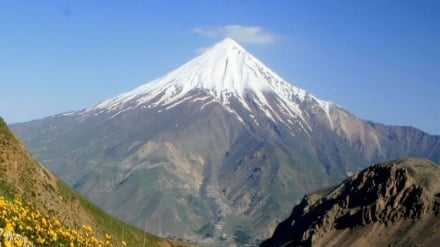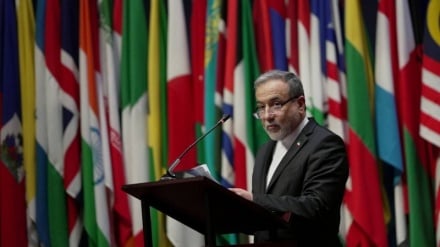40th anniversary of Imam Musa Sadr's abduction (1)
On the occasion of 40th anniversary of kidnapping Imam Musa Sadr we have prepared a special two-part program. In the first part we talk about the biography and personality of Imam Musa Sadr and the impact of his activities on the Lebanese political developments in the past half a century.
Imam Musa Sadr is a well-known name in the Islamic world especially for the people of Iran and Lebanon. The life of Imam Musa Sadr has two chapters. The first chapter started from the time of his birth till the age of 31 which he spent in Iran and the second chapter begins from the age of 31 until 50 in Lebanon and then his abduction on his way to Libya on August 31, 1978 at the invitation of then Libyan leader Muammar Qaddafi. Different accounts have so far been said about the whereabouts of this great personality.
The Lebanese people call Seyyed Musa Sadr as Imam which means leader in the Islamic ideology and originally is used for the 12 divinely appointed infallible successors of the Prophet. In addition to the infallible leaders, this title has been used for few figures such as Imam Khomeini and Imam Musa Sadr throughout the history of Islam. Imam Mus Sadr was born on June 4, 1928 in holy Qom, the center of Islamic sciences, in a well-known scholarly family who had lived in Iran, Iraq and Lebanon. His father, Seyyed Sadr al-Din Sadr, was one of the successors of Sheikh Abdul Karim Haeri, the reviver of Qom seminary and great source of emulation of his time. Mother of Imam Musa Sadr, Safia Tabatabai Qomi was the daughter of Haji Aqa Seyyed Hossein Tabatabai Qomi, who led the uprising of the people of Mashhad against the British flunky Reza Khan. His paternal grandfather, Seyyed Ismail Sadr, the successor of Mirza Shirazi, the great source of emulation of his time. Seyyed Musa Sadr spent the elementary school in Qom’s Hayat School. Then he entered Sanaai high school and at the same time he studied Islamic sciences at Qom seminary. He completed preliminary courses in a short time. In the beginning of spring 1947, Seyyed Musa Sadr entered the middle stage and continued teaching and studying at the seminary until 1953. Some of his prominent masters included Grand Ayatollah Seyyed Hussein Borujerdi, Imam Khomeini (God's mercy upon him), Allameh Tabatabai and Seyyed Mohammad Mohaqiq Damaad.
Imam Musa Sadr entered Tehran University in 1950 and studied economics and graduated from the university in 1953. After completing his studies in Tehran University, he left for Najaf to continue his theological studies and stayed there until 1958. Seyyed Musa Sadr was an active theological student and spent his time on studying religious sciences. Simultaneously, he became a member of the Trusteeship Council of Montada Al-Nashr, and after returning to Qom, he founded and managed a national school and was also edited the newly established Maktab-e Islam "Islamic School" magazine. In early 1959, following the advice of great figures such as Grand Ayatollah Borujerdi, Ayatollah Hakim and Sheikh Morteza Al-e-Yasin, Imam Musa Sadr migrated to Lebanon. Prior to this, Imam Musa Sadr had traveled to the country twice and met with Seyyed Sharaf-al-Din Ameli. Seyyed Sharaf-al-Din was one of the prominent scholars of Lebanese Shias and explicitly termed Imam Musa Sadr as qualified for leading the Lebanese Shias. The second chapter of Imam Musa Sadr’s life in Lebanon began after leaving his homeland Iran. During his 20-year residence in Lebanon, he had a profound and lasting impact on Lebanon specially the Shias. Imam Musa Sadr was a source of peace, proximity of religions, bringing consistency to the fragile and dispersed situation of the Lebanese Shias. Imam Musa Sadr's lasting impact on Lebanon can be understood when one studies the turbulent Lebanon of that time.
Lebanon is a very multi-ethnic country with several tribes, religions and religious sects. The followers of every religion or religious sect in Lebanon have sought to stabilize and consolidate their position and prevail over the followers of other religions. Nearness to the Occupied Palestine and the aggressive policies of the Zionist regime of Israel and colonial powers such as France and Britain caused the adherents of different religions and sects in Lebanon to seek the support of regional and trans-regional players. Meanwhile, the Shias, despite having the majority in Lebanon, did not have any support inside or outside Lebanon. The colonial rule in Lebanon and the lack of attention to Shias, despite the efforts of their leaders, have resulted in the political marginalization of Shias and made them more deprived compared to other sects and ethnic groups.
The growth of awareness and the promotion of Shia positions and their role in the struggle against the Zionist regime is highly owed to the inexhaustible efforts of Imam Musa Sadr. His efforts in the political and social arena, as well as the effects of the Islamic Revolution of Iran, turned Lebanese Shias into one of the most powerful groups in the country. The presence of various religions in Lebanon has led the country to become one of the most diverse countries in the world. There is a firm bond between religion and politics in the country. As a result, different religions, sects and even ethnic groups have affected the political fabric of the country.
Lebanon became the colony of France after the First World War. France has had a profound impact on this country with its colonialist policies and still considers Lebanon as part of its sphere of influence in West Asia (Middle East). Accordingly, the constitution of Lebanon was drafted and implemented on the basis of French colonial policies. In view of the differences among various religions and sects in Lebanon, Imam Musa Sadr tried to restore peace, stability and security in Lebanon within the framework of the same constitution, and to promote the position of the Shias as the largest religious group in Lebanon. Of the nearly eighteen religions and sects in Lebanon, there are twelve Christian sects and five Islam ones. The Islamic sects comprise: Shia, Sunni, Druze, Alawite, and Ismaili. The Christians, too, include: Maronite, Catholic, Armenian, Orthodox, Chaldean, Nestorian, and other smaller minorities.
Among the characteristics of the great leaders and reformers are their trans-ethnic and trans-religious features. Although they adhere to a specific religion or sect, they have a trans-ethnic and trans-religious vision. This trait makes them charismatic and popular among various ethnicities and sects to the extent that their words are heard and followed by people. Although Imam Musa Sadr, in the turbulent circumstances of the 1960s and 1970s, upgraded the status of Shias in the Lebanese political scene and turned them into a decisive element in the process of Lebanese political developments, followers of other religions were not upset of Imam Musa Sadr’s measures in improving the political, economic and social conditions of the Shias. They considered Imam Musa Sadr the symbol of national unity; and as a comprehensive personality with a lofty stature, they trusted in him. During migration to Lebanon, Imam Musa Sadr had many enemies among the Shias and non-Shias. One of the most important features of Imam Musa Sadr was that he treated his opponents with the conduct of the Prophet and forgave their insults and harassments with forbearance and patience. During the leadership of Imam Musa Sadr, none of his opponents were under the slightest pressure, and not even faced disrespect or denial of their social rights. This was while Imam Musa Sadr, as a Shia scholar, enjoyed so much respect and dignity. In the next program we will discuss the thoughts and measures of Imam Musa Sadr until his abduction by the agents affiliated to and paid by the fabricated regime in Tel Aviv.
FK/RM/ME


